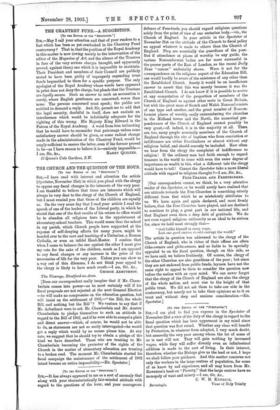[To THE EDITOR OF THE " SPECTATOR.1
Srn,—It has always appeared to me as a sort of anomaly that along with your characteristically fair-minded attitude with regard to the questions of the hour, and your courageous
defence of Free-trade, you should regard religious questions solely from the point of view of one sectarian body,—viz., the Church of England. In your article in the Spectator of November 21st on the attitude of the Church to fiscal policy no appeal whatever is made to others than the Church of England. They are essentially the guardians of the poor. , But if attendance at places of worship be any guide, the various Nonconformist bodies are far more successful in the poorer parts of the East of London, as the recent Daily. News "census" undeniably shows. Were it not for the correspondence on the religious aspect of the Education Bill, one would hardly be aware of the existence of any other than the Established Church. Surely it would be an insufficient answer to assert that this was merely because it was the Established Church. I do not know if it is possible to arrive at any computation of the proportion of members of the Church of England as against other sects in Great Britain,, but with the great mass of Scotch and Welsh Nonconformists of one type and another, and the great number of Noncon- formist places of worship easily outnumbering the churches in the Midland towns and the North, the numerical pre- ponderance of the Church of England cannot possibly be very great,—if, indeed, it is in the majority at all. Thera are, too, many people nominally members of the Church of England through the rite of baptism who from conviction or indifference are either Freethinkers or almost without any religious belief, and should scarcely be included. How often. we hear from the clergy the complaint of indifference to religion ! If the ordinary man had faith enough to regard treasure in the world to come with even the same degree of importance as wealth in this, what a different tale the clergy would have to tell ! Cannot the Spectator take a more liberal attitude with regard to religious thought P—I am, Sir, etc.,
FREE-TRADER AND FREETHINKER.
[Our correspondent cannot, we think, be a very attentive reader of the Spectator, or he would surely have realised that our attitude towards the Free Churches is something utterly different from that which he so mistakenly attributes to us. We have again and again declared, and most firmly believe, that the Free Churches have played, and are destined to continue to play, a great part in our national life, and that England owes them a deep debt of gratitude. We do not even regard religious uniformity as an ideal to be striven for, since we hold most strongly that— "God fulfils himself in many ways,
Lest one good custom should corrupt the world."
The article in question was addressed to the clergy of the Church of England, who in virtue of their offices are often tithe-owners and glebe-owners, and so liable to be specially appealed to on the fiscal question, though on this side, as we have said, we believe fruitlessly. Of course, the clergy of the other Churches are also guardians of the poor; but since they are not endowed from public funds, laymen have not the same right to appeal to them to consider the question now before the nation with an open mind. We can never forget that the clergy of the Church of England are also the clergy of the whole nation, and must rise to the height of that public trust. We did not ask them to take our side in the controversy, but merely not to take their opinions as to it on trust and without deep and anxious consideration.—En. Spectator.]


















































 Previous page
Previous page